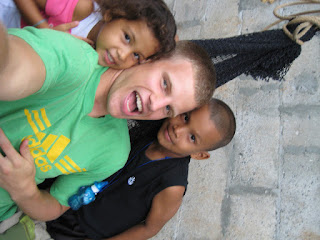Well I have some big news:
 |
| Nuevo Vigia, my community for the next 2 years |
Last week I had a chance to visit the community to meet the people and get to know the area. Lino, a farmer who lives there, is my working counterpart. He came to meet me in Panama City, and we traveled out to Nuevo Vigia together. After a six hour bus ride almost to the end of the Pan American highway, a ride in a chiva (taxi truck), and a half hour boat ride in a dugout canoe up two rivers, we arrived!
The community is about 370 people, with around 100 houses. Houses are settled overlooking the Tuqueza River, which is a very important part of their lifestyle. The river is used for everything: transportation, bathing, laundry, a toilet, fishing, and drinking water. You can maybe see the problem here... There is no electricity except for a solar panel at their school, and a few small generators that people own. Also there is no water system, and only a handful of latrines. Water is hauled by women carrying buckets on their heads, which is no easy task climbing up the river bank and walking to their houses.
 |
| The Rio Tuqueza, also the community hangout area |
 |
| My host family house for my first 3 months in site |
While the Embara people were pretty shy at first (I guess I'm pretty scary looking), they really opened up after a couple days and were very friendly. My host family took great care of me, and I ate quite well, by rural Panamanian standards. I found the best way to meet people is to go jump in the river. Pretty much at any time of day there will be groups of people bathing and hanging out (still clothed), kids playing on the beaches, guys spear fishing, or women doing laundry. People are somewhat obsessive about taking baths, at least two or three a day, and it's a very social event.
After a week I came back to the city, and now we're finishing our training. I'm really excited to go back for good, and to continue getting to know people. There's a lot more to say here, but I don't quite have time right now. I definitely feel that God has been preparing the way for me, and I have a lot of peace going into this. Things are still a little intimidating and there will be a lot of adjustments, but I think I'm as ready for it as I can be.
 |
| My host family for my first visit |






